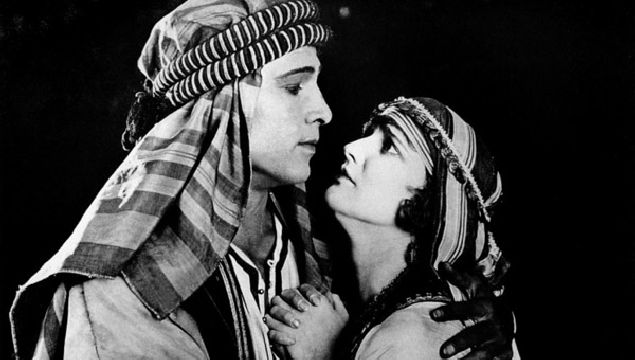The Sheik (1921) 
“A photoplay of tempestuous love between a madcap English beauty and a bronzed Arab chief!”

Director: George Melford
Cast: Rudolph Valentino, Agnes Ayres, Ruth Miller
Synopsis: A charming Arabian sheik becomes infatuated with an adventurous, modern-thinking Englishwoman and abducts her to his home in the Saharan desert.
There’s little doubt that George Melford’s The Sheik would be largely forgotten today if it wasn’t for the presence of leading man Rudolph Valentino, who had shot to fame earlier in 1921 thanks to his performance in The Four Horsemen of the Apocalypse. It’s not because it is so deeply entrenched in the prejudices of its era or because it reinforces the assertion that all females are helpless creatures who need saving from themselves that it would have been forgotten; no, it would mostly be because it’s a ponderous, badly written and acted melodrama with only a few neatly composed shots of the desert (Californian, not Arabian) and some nicely decorated intertitles to recommend it.
The heroine of The Sheik — although it’s really something of a misnomer to describe her as such — is the high-spirited and independent Lady Diana Mayo (Agnes Ayres — The Son of the Sheik), who has all the aged society dames in a tizzy over her plans to embark on a month’s trek into the desert with only Arabs for company. Diana’s not the sort to be deterred by societal disapproval however, and even her brother, Sir Aubrey (Frank Butler) is unable to change her mind after accompanying her for the first day of her trek. It’s not long after her brother parts company with the caravan that Diana is abducted by Sheik Ahmed Ben Hassan (Valentino — The Eagle) to whose attention she came after sneaking into a sort of wife auction at a casino non-Arabs were forbidden to attend.
It’s not difficult for Diana (or the audience) to figure out what’s on the Sheik’s mind when he spirits her back to his luxurious tent in the desert, but a fierce sandstorm temporarily prevents him from having his wicked way with her. Diana proves to be so resistant to the Sheik’s advances that he begins to have second thoughts about forcing himself upon her, and the arrival of his great friend, the romantic novelist Dr. Raoul de St. Hubert (Adolphe Menjou — A Woman of Paris, A Star is Born) serves only to provoke his conscience even further. Matters finally come to a head when Diana is abducted again — this time by the far more dastardly bandit Omair (Walter Long — I Am a Fugitive from a Chain Gang, The Thin Man) who shares none of the Sheik’s new-found reservations about forcing himself upon nice white ladies.
It’s safe to say that The Sheik is a movie that won’t go down well with feminists, despite a promising start which suggests that Lady Diana might be one of those plucky heroines capable of looking after themselves. Sadly, this initial impression proves to be mistaken. Lady Diana does in fact succeed in escaping the clutches of the Sheik’s man servant Gaston (Lucien Littlefield — The Cat and the Canary, Bad Men of Tombstone) only to promptly fall off her horse once she’s made her getaway and stumble into the path of that dastardly Omair. She also proves to be a female who doesn’t know her own heart until a potential rapist comes along and attempts to bend her to his will and puts her straight.
Just as bad as Lady Diana’s poorly conceived (even for 1921) character is the turgid pace of the plot. Adolphe Menjou’s belated arrival halfway through the movie is badly needed and does improve the film some, but his role as the Sheik’s conscience — a possible love rival angle is promptly dropped as suddenly as it’s introduced — means that he’s a largely ineffectual character. At least Menjou gives a reasonable performance — Valentino and Ayres appear to be waging some secret competition to see who can deliver the worst performance with Valentino perpetually leering and rolling his eyes while Ayres heaves her bosom and chews her knuckles for all she’s worth. The Sheik is a poor movie wholly undeserving of the success it enjoyed and the subsequent place it holds in movie history.
(Reviewed 9th August 1921)
httpv://www.youtube.com/watch?v=sAktsJYTuLI
